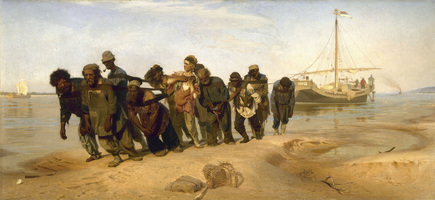Eh, Ukhnem, The song of the Volga Boatmen
|
"Eh, Ukhnem" or "The song of the Volga Boatmen" is one of the most famous Russian traditionals. Already in 1866 Mily Balakirev did mention the song in his book of folk songs, with only one verse though, the other two verses were added at a later date.
"The song of the Volga Boatmen" was sung by burlaks, persons who hauled barges and other vessels upstream. They appeared in Russia at the end of the 16th century and their number increased as the freight transport expanded. The name "burlak" itself originated from the Tatar word "bujdak", which means "homeless". Other sources do say that "burlak" comes from the middle-German word "Burlach", which means "working team with fixed rules". |
The main areas where the burlaks operated, were the Wolga river, from Moscow to Astrakhan, the White Sea route, from Moscow to Arkhangelsk and the Djneper river in Ukraine. Some burlaks worked from spring to autumn, others did work on temporarely base. The burlaks were often organized in artels, semi-formal associations for craft and artisanal enterprises, especially in winter, because otherwise they might remain unimployed, as the Russian rivers were often frozen during that period.
|
Most burlaks were landless or poor peasants and their job on pulling the loaded vessels was very hard: harnessed to the boats by a strap, they had to pull the vessels against the current. As the boat had to be pulled in one step, the burlaks were led by a "voldoliv", who set the pace and the rhythm. Also the singing while pulling the heavy load, made it easier to maintain the same tempo with the complete group.
With the coming of the Industrial Revolution, when the mechanical motors appeared on the rivers, the number of burlaks declined and at the beginning of the 20th century all burlaks had disappeared. The picture of the burlak was popular in Russian proverbs, songs and artwork: on top of the page is an image of Ilya Repin's famous painting "Barge haulers on the Volga". The song "Eh, Ukhnem" was popularised by Fjodor Chaliapin and became a favourite concert piece of bass singers ever since. The jazz arrangement of Glenn Miller reached the first place of the US charts in 1941 and A. Glazunov based one of the themes of his symphonic poem "Stenka Razin" on "Eh, Ukhnem". The Spanish composer Manuel de Falla wrote an arrangement of the song which was published under the name "Canto de los remeros del Volga". He wrote it on request of Ricardo Baeza, who donated all the proceeds from the song's publication to the League of Nations, in order to provide financial relief for the more than two million Russian refugees, who had been displaced and imprisoned during World War I. Sources: https://en.wikipedia.org/wiki/The_Song_of_the_Volga_Boatmen https://en.wikipedia.org/wiki/Burlak http://imslp.org/wiki/Song_of_the_Volga_Boatmen_(Balakirev,_Mily) http://vesture.eu/index.php/Burlaks |
|
|
Russian lyrics
Эй, ухнем! Эй, ухнем! Ещё разик, ещё да раз! Эй, ухнем! Эй, ухнем! Ещё разик, ещё да раз! Разовьём мы берёзу, Разовьём мы кудряву! Ай-да, да ай-да, Aй-да, да ай-да, Разовьём мы кудряву. Разовьём мы кудряву. Эй, ухнем! Эй, ухнем! Ещё разик, ещё да раз! Мы по бережку идём, Песню солнышку поём. Ай-да, да ай-да, Aй-да, да ай-да, Песню солнышку поём. Эй, эй, тяни канат сильней! Песню солнышку поём. Эй, ухнем! Эй, ухнем! Ещё разик, ещё да раз! Эх ты, Волга, мать-река, Широка и глубока, Ай-да, да ай-да, Aй-да, да ай-да, Волга, Волга, мать-река Эй, ухнем! Эй, ухнем! Ещё разик, ещё да раз! Эй, ухнем! Эй, ухнем! |
Transliteration
Ey, ukhnem! Ey, ukhnem! Yeshcho razik, yeshcho da raz! Ey, ukhnem! Ey, ukhnem! Yeshcho razik, yeshcho da raz! Razovyom my beryozu, Razovyom my kudryavu! Ai-da, da ai-da, Ai-da, da ai-da, Razovyom my kudryavu. Razovyom my kudryavu. Ey, ukhnem! Ey, ukhnem! Yeshcho razik, yeshcho da raz! My po berezhku idyom, Pesnyu solnyshku poyom. Ai-da, da ai-da, Ai-da, da ai-da, Pesnyu solnyshku poyom. Ey, Ey, tyani kanat silney! Pesnyu solnyshku poyom. Ey, ukhnem! Ey, ukhnem! Yeshcho razik, yeshcho da raz! Ekh, ty, Volga, mat'-reka, Shiroka i gluboka, Ai-da, da ai-da, Ai-da, da ai-da, Volga, Volga, mat'-reka Ey, ukhnem! Ey, ukhnem! Yeshcho razik, yeshcho da raz! Ey, ukhnem! Ey, ukhnem! |
English translation
ho, hey ho! ho, hey ho! Once more, once more, and still once more ho, hey ho! ho, hey ho! Once more, once more, and still once more Now we fell the stout birch tree, Now we pull hard: one, two, three. Ay-da, da, ay-da! Ay-da, da, ay-da! Now we pull hard: one, two, three. Now we pull hard: one, two, three. ho, hey ho! ho, hey ho! Once more, once more, and still once more As we walk along the shore, To the sun we sing our song. Ay-da, da, ay-da! Ay-da, da, ay-da! To the sun we sing our song. Hey, hey, let's heave a-long the way to the sun we sing our song ho, hey ho! ho, hey ho! Once more, once more, and still once more Oh, you, Volga, mother river, Mighty stream so deep and wide. Ay-da, da, ay-da! Ay-da, da, ay-da! Volga, Volga, mother river. ho, hey ho! ho, hey ho! Once more, once more, and still once more ho, hey ho! ho, hey ho! |

